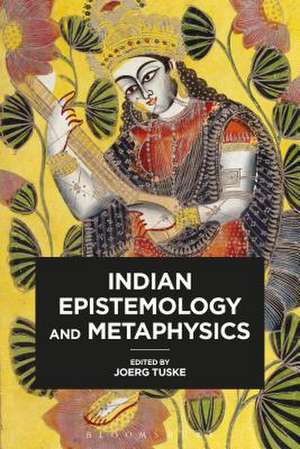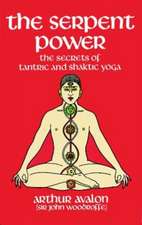Indian Epistemology and Metaphysics
Editat de Joerg Tuskeen Limba Engleză Paperback – 21 aug 2019
| Toate formatele și edițiile | Preț | Express |
|---|---|---|
| Paperback (1) | 173.03 lei 6-8 săpt. | |
| Bloomsbury Publishing – 21 aug 2019 | 173.03 lei 6-8 săpt. | |
| Hardback (1) | 633.78 lei 6-8 săpt. | |
| Bloomsbury Publishing – 26 iul 2017 | 633.78 lei 6-8 săpt. |
Preț: 173.03 lei
Preț vechi: 300.04 lei
-42% Nou
Puncte Express: 260
Preț estimativ în valută:
33.11€ • 34.21$ • 27.56£
33.11€ • 34.21$ • 27.56£
Carte tipărită la comandă
Livrare economică 25 martie-08 aprilie
Preluare comenzi: 021 569.72.76
Specificații
ISBN-13: 9781350126688
ISBN-10: 1350126683
Pagini: 448
Dimensiuni: 156 x 234 x 28 mm
Greutate: 0.63 kg
Editura: Bloomsbury Publishing
Colecția Bloomsbury Academic
Locul publicării:London, United Kingdom
ISBN-10: 1350126683
Pagini: 448
Dimensiuni: 156 x 234 x 28 mm
Greutate: 0.63 kg
Editura: Bloomsbury Publishing
Colecția Bloomsbury Academic
Locul publicării:London, United Kingdom
Caracteristici
Demonstrates the importance of epistemological and metaphysical topics to an understanding of Indian thought
Notă biografică
Joerg Tuske is Professor in the Philosophy Department at Salisbury University, Maryland, USA.
Cuprins
1. Introduction: Epistemology and Metaphysics in Indian Philosophy, Joerg TuskeKnowledge, Language and Logic2. Epistemology, Metaphysics and Logic in Pracina Nyaya and Buddhist Philosophy, Claus Oetke3. Fallacies and Defeaters in Early Navya Nyaya, Stephen H. Phillips4. Jayarasi and the Skeptical Tradition, Eli Franco5. Jainism. Disambiguate the Ambiguous, Piotr BalcerowiczConsciousness and the External World6. Proofs of Idealism in Buddhist Epistemology: Dharmakirti's Refutation of External Objects, Birgit Kellner7. Materialism in Indian Philosophy: the Doctrine and Arguments, Pradeep P. Gokhale8. Sakhya: Dualism without Substances, Ferenc Ruzsa9. Saiva Nondualism, Raffaele Torella10. An Indian Debate on Optical Reflections and Its Metaphysical Implications: Saiva Nondualism and the Mirror of Consciousness, Isabelle Ratie´Universals and Momentary Existence11. A Road Not Taken in Indian Epistemology, John Taber12. The Role of Causality in Ratnakirti's Argument for Momentariness, Joel FeldmanSelf, No-Self and Self-Knowledge13. Self or No-Self? The Buddhist-Brahmanical Atman Debate, Alex Watson14. Where the Self and Other Meet: Early Yogacara Buddhist Approaches to Inter-Subjectivity, Roy Tzohar15. Luminous Mind: Self-Luminosity vs. Other-Luminosity in Indian Philosophy of Mind, Matthew MacKenzie16. Solving Kant's Problem: K. C. Bhattacharyya on Self-Knowledge, Jay L. GarfieldConcepts and Cognitions17. Nyaya Theory of Concepts, Keya Maitra18. Vasubandhu's Arguments for the Cognition of Nonexistent Objects, Zhihua YaoList of termsTimeline of philosophersIndex
Recenzii
Gathering together work by many of today's leading scholars of Indian philosophy, this volume well represents the great range and sophistication of India's diverse traditions of philosophy. These traditions ought to have an honored place in the curricula of contemporary philosophy departments, and this collection of essays makes for a fine introduction to the philosophically engaged study of them.
This is a fine and wide-ranging collection of rigorously argued, textually-grounded, and philosophically fruitful essays. The topics covered should be of interest to both specialist in Indian thought, and the increasing number of scholars of Western philosophy who recognize the significance of the classical Indian traditions. The essays are original, while also serving as sophisticated introductions to a variety of issues in epistemology and metaphysics.
This is a fine and wide-ranging collection of rigorously argued, textually-grounded, and philosophically fruitful essays. The topics covered should be of interest to both specialist in Indian thought, and the increasing number of scholars of Western philosophy who recognize the significance of the classical Indian traditions. The essays are original, while also serving as sophisticated introductions to a variety of issues in epistemology and metaphysics.














